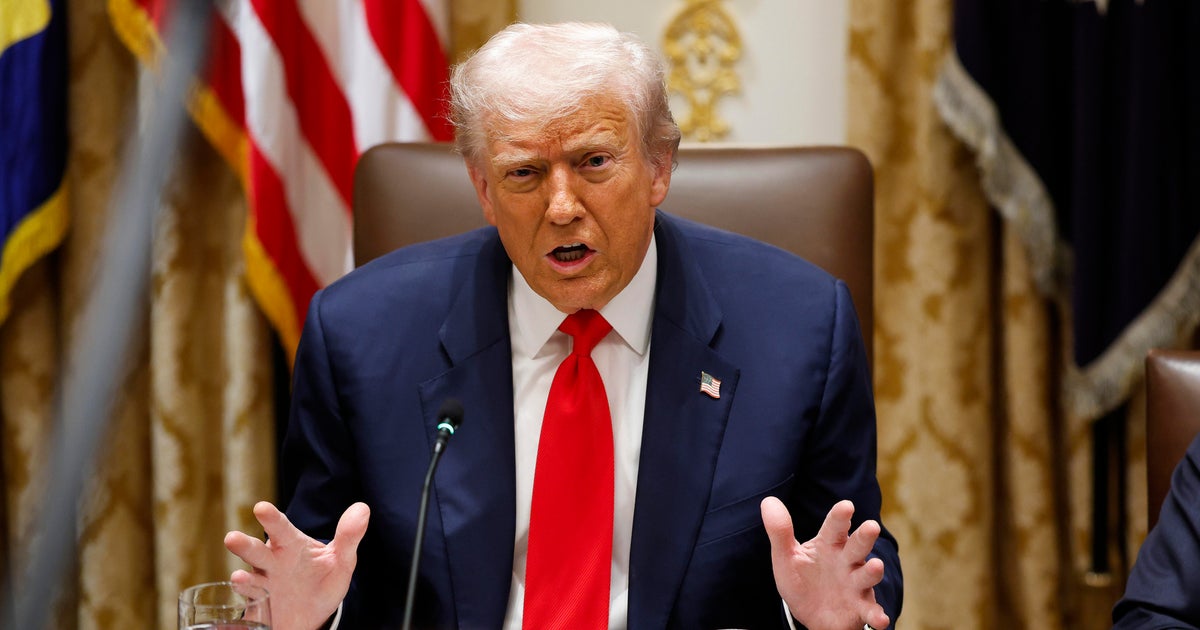
Washington — The government of Ontario will pause an anti-tariff ad campaign aimed at the U.S., the Canadian province’s leader announced Friday, less than a day after President Trump vowed to end trade negotiations with Canada over an ad that uses late President Ronald Reagan’s voice.
Ontario Premier Doug Ford said the ad campaign will be put on hold starting Monday “so that trade talks can resume.” He said he’s told his team to “keep putting our message in front of Americans over the weekend so that we can air our commercial during the first two World Series games.”
The move came after Mr. Trump torched the ad on Truth Social late Friday, and wrote: “Based on their egregious behavior, ALL TRADE NEGOTIATIONS WITH CANADA ARE HEREBY TERMINATED.”
The ad in question includes excerpts from a 1987 radio address given by Reagan, in which the former president said tariffs work “only for a short time” and “hurt every American worker and consumer.”
“High tariffs inevitably lead to retaliation by foreign countries and the triggering of fierce trade wars,” Reagan said, as quoted by the ad.
White House spokesman Kush Desai said in a statement on Friday, prior to Ford’s decision to pull the ad next week, that the Trump administration “has repeatedly sought to address Canada’s longstanding, unfair trade barriers.”
“These good-faith efforts with Canadian officials have not led to any constructive progress,” Desai said. “Ontario’s taxpayer-funded ad campaign on American TV networks — that misleadingly edited President Reagan’s 1987 radio address about trade — is the latest example of how Canadian officials would rather play games than engage with the administration. As President Trump made clear on Truth Social, further talks are a futile effort if Canada can’t be serious.”
Ford wrote on X Friday: “Our intention was always to initiate a conversation about the kind of economy that Americans want to build and the impact of tariffs on workers and businesses. We’ve achieved our goal, having reached U.S. audiences at the highest levels.”
CBS News has reached out to the White House for comment on Ford’s decision.
Canadian Prime Minister Mark Carney told reporters in response to the breakdown in talks Friday, “we can’t control the trade policy of the United States,” but his government has sought to make progress on trade negotiations.
“We stand ready to pick up on that progress and build on that progress when the Americans are ready to have those discussions,” he said.
Earlier Thursday, the Ronald Reagan Foundation said in a statement that the ad used “selective audio” and “misrepresents the Presidential Radio Address.” The foundation also said the government of Ontario didn’t seek permission to use snippets from Reagan’s address, and said it is “reviewing its legal options in this matter.”
Mr. Trump pointed to the Ronald Reagan Foundation’s statement in his Truth Social post, calling Ontario’s ad “FAKE” and claiming it “only did this to interfere with the decision of the U.S. Supreme Court” — referring to a pending case on the legality of Mr. Trump’s tariff strategy.
Canada is the second-largest trading partner for the U.S. after Mexico, with the U.S. importing $412.7 billion worth of Canadian goods last year, and Canada buying $349.4 billion in American goods, according to U.S. statistics.
But relations between the U.S. and its northern neighbor have frayed amid Mr. Trump’s trade strategy. He initially imposed higher tariffs on Canada earlier this year, accusing the country of not doing enough to stem the flow of illicit drugs and migration across the border — allegations that Canadian officials pushed back on.
Over the summer, Mr. Trump hiked tariffs on the country to 35%, though a large share of goods are exempt because they’re covered by the 2020 U.S.-Mexico-Canada Trade Agreement.
Back in March, Canada imposed 25% retaliatory tariffs on many U.S. products not covered by the USMCA. But in August, as part of efforts to reach a deal on tariffs, Carney said those retaliatory tariffs were being lifted. The two nations have yet to reach such a deal.
Meanwhile, Carney said earlier this week the country would seek to double its exports to countries other than the U.S., citing the “pall of uncertainty” caused by American tariffs.
Still, Carney has sought to negotiate with Mr. Trump, visiting the White House earlier this month.
